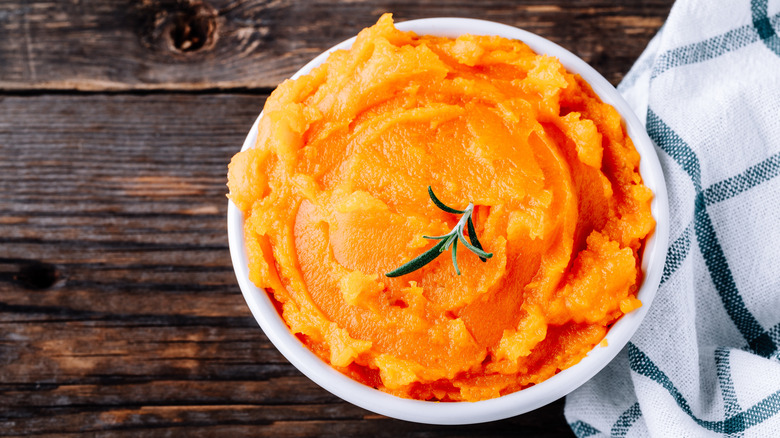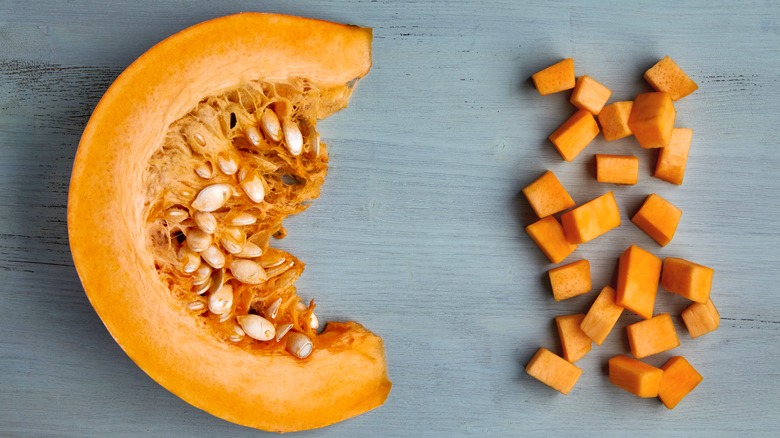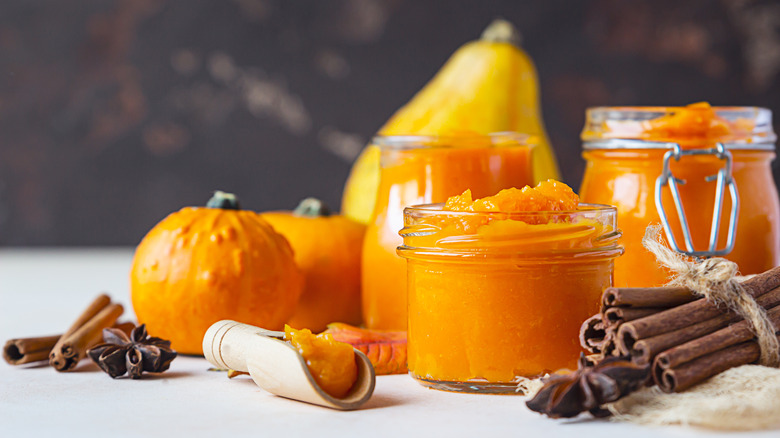The Nutritional Reason You May Want To Use Canned Pumpkin Instead Of Fresh
There is never enough that can be said about pumpkin. There is something inherently charming about this fruit — whether it be its unique orange color or its distinct sweet flavor, which makes it perfect for cookies and cakes. Who's to say? But the squash has always been a staple food in the Americas. It originated 9,000 years ago when the Indigenous peoples of the New World began tending to the pumpkin, along with its sister crops maize and beans. These people relied on it to provide them with the necessary nutrients to keep them alive (via University of California).
These days, we use pumpkins less as a tool of survival, but more as an ingredient of enjoyment. It's a special favorite during the autumn months when nights grow longer and cold weather blows in, chilling us to our bones. Pumpkin is often served warm and seasoned with sweet fall spices. But we should be finding more savory ways to eat pumpkin so we can utilize its nutritional value as well. To do that, it's best to look not to fresh pumpkin, but at the pureed kind you can find at the store.
Pumpkin is one of the healthiest fruits you can eat
If you are looking for the best nutritional boost, this is one of those rare occasions when fresh fruit doesn't beat out canned fruit. But firstly, it is important to distinguish the difference between pumpkin puree and pumpkin pie filling.
Medical News Today informs us that while pumpkins are a fantastic source of vitamins, protein, and fiber, these aspects are mitigated when mixed with an abundance of sugars and syrups. Pumpkin puree and canned pumpkin pie mix are two very different things even though they are often sold and marketed similarly. So make sure that when you are shopping for some healthy canned pumpkin, you don't end up picking up pumpkin pie filling instead.
Pumpkin (without all the additives) is very good for the overall health of the body, especially since it supplies us with beta-carotenes. According to Healthline, beta-carotene is the pigment that gives the pumpkin its orange and yellow hue. But it is more than just an aesthetic enhancer. When our bodies process beta-carotene, they convert it into vitamin A, which is fantastic for our hearts, lungs, and immune systems (via U.S. Department of Health). Beta carotene is also a powerful antioxidant that helps protect against cancers, heart disease, and Alzheimer's disease.
Why buy canned pumpkin?
If you're excited to start eating more pumpkin immediately by blending it into your protein shakes and mixing it into your stews, don't run directly to the pumpkin patch to get your fruit. There is actually a cheaper, less time-consuming, and more efficient method for getting the nutrients you need out of your pumpkin – and that is to buy it pureed in a can. It goes against everything we've been taught about produce. "Fresh is best" is the mantra we learn in health classes and hum to ourselves when perusing farmers' markets. But pumpkin is the exception to the rule.
The San Francisco Gate reports that a one-cup serving of cooked fresh pumpkin has 0.5 milligrams of beta-carotene, but one cup of canned pumpkin has a whopping 17 milligrams of beta-carotene! Canned pumpkin is much denser in nutrients because it is softened with a wilting machine (which steams the pumpkin), then crushed until it is smooth in consistency, and finally squeeze to remove any excess water (via Today). Since pumpkin is 94% water, when all that H2O is removed during the canning process, the puree becomes much denser in volume than freshly made pumpkin mix. That is why there are more nutrients in a single cup of canned pumpkin rather than in a fresh pumpkin. So, if you are truly looking for higher beta-carotene and vitamins per serving, you're better off getting store-bought pumpkin puree.


